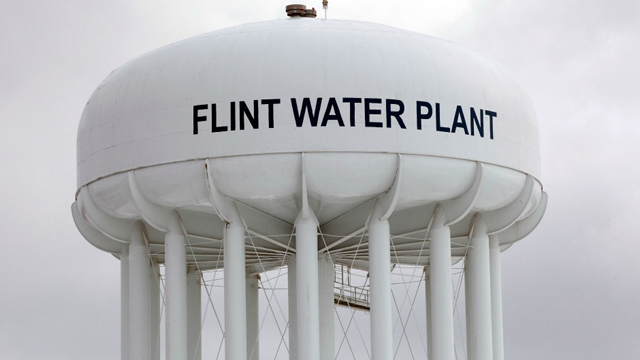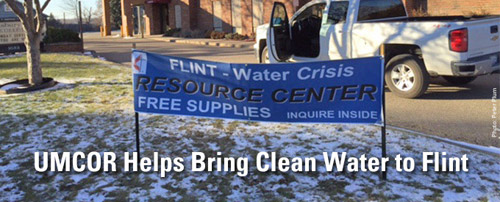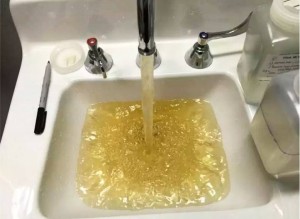FLINT, MI – JANUARY 13: The Flint Water Plant tower is shown January 13, 2016 in Flint, Michigan. On Tuesday, Michigan Gov. Rick Snyder activated the National Guard to help the American Red Cross distribute water to Flint residents to help them deal with the lead contamination that is in the City of Flint’s water supply. (Photo by Bill Pugliano/Getty Images)
Detroit Conference Bishop Deborah Kiesey is appealing for continued prayers and financial support to help remedy the ongoing lead-contaminated water crisis in Flint, Mich.
While thankful for prayers–“They are powerful, and they mean a great deal to the entire Michigan Area”–she also wrote to the Council of Bishops, “The greatest need at the moment is simply for financial support. The truckloads of bottled water, though helpful, are only a stopgap measure. Financial gifts will help ensure the continued availability of filters, as well as the management of the medical needs of children involved.”
For donations Kiesey recommended her Bishop’s Special Appeal for the Crossroads District Water Response, with giving online at http://bit.ly/FlintRelief or by mail to the Detroit Conference Treasurer’s Office, 1309 N. Ballenger Hwy, Suite 1 Flint, MI 48504. Checks should be made payable to “Detroit Conference.” Please include: #0918 (Crossroads District Water Response)” in the memo line.
Donations may also be made through the United Methodist Committee on Relief (UMCOR), which gave a $10,000 emergency grant to the Crossroads District to aid its collaboration with government agencies and relief groups to provide filtration pitchers, replacement filters, and bottled water to people in Flint.
When the water in Flint became contaminated with lead in 2014, the community of 99,000 residents faced a crisis that left many vulnerable to health problems, stress, and financial strain. The Crossroads District first contacted UMCOR about the water situation in October 2015.
“Together, we took a pro-active ecumenical approach to the crisis months before it became national news,” said Greg Forrester, who leads UMCOR’s U.S. Disaster Response work.
“We have eight United Methodist churches that serve Flint,” explained Peter Plum, emergency water crisis coordinator. Pastors of the churches met to discuss how to respond to the water crisis, and they agreed the best way to coordinate a church-wide response was to hire a coordinator.
Now Plum is helping to reach some of the most vulnerable people in Flint. “The county and the city are offering everything that we are offering in terms of filters,” Plum explained, “so we decided to get involved with constituents and neighbors that don’t necessarily trust the government.”
Funds became tighter for both government and non-government organizations when the water filters lasted less than the expected time. “When this first happened, the water was so bad that a 90-day filter was lasting 30 days,” said Plum.
The contamination began in April 2014, when the city discontinued purchasing water from Detroit. The new source was water drawn from the Flint River and treated in Flint. Several months after this conversion, unsafe contaminates and lead began to appear in the water.
In October 2015, Flint resumed its agreement to purchase water from Detroit, but there are still unsafe levels of contamination and risks of chemicals and lead in the water. Because of the corrosiveness of the water supplied from the Flint River for several months, there are outdated pipes throughout the water distribution system that are failing and releasing contaminates.
Plum is now working toward expanding the response by working with ecumenical partners, as well as looking into which churches in Flint could serve as “safe water stations” for the community. “We need both an ecumenical and a long-term strategy,” said Plum.
When will water in Flint be safe? It’s difficult to tell, agreed he and others. “We’re worried about long-term effects,” he said.
Your gift to UMCOR U.S. Disaster Response, Advance #901670, helps UMCOR respond to a crisis immediately and over the long haul.
Adapted from an article on UMCOR’s Website and Bishop Kiesey’s message.



